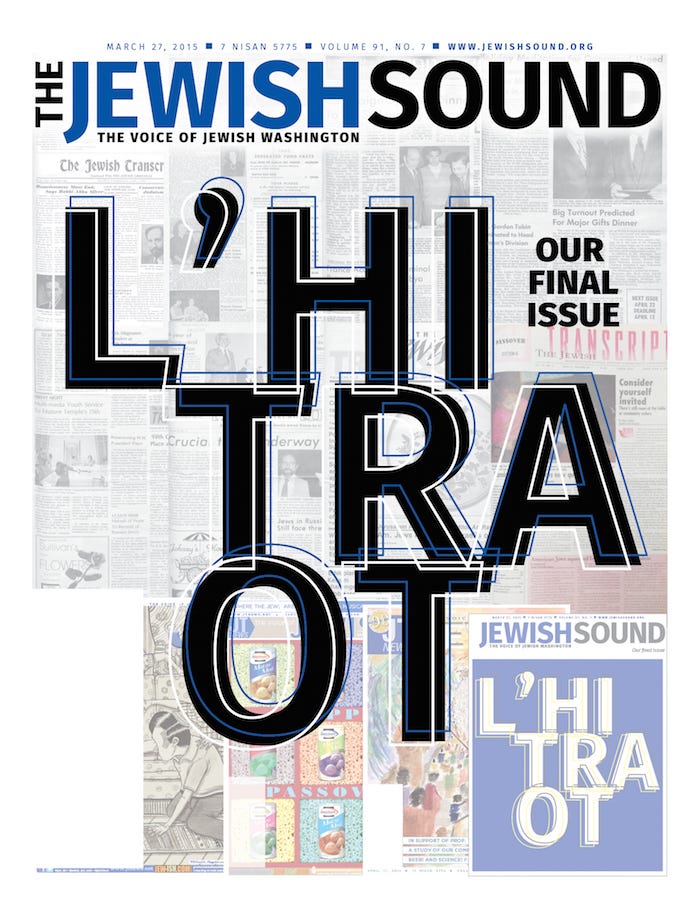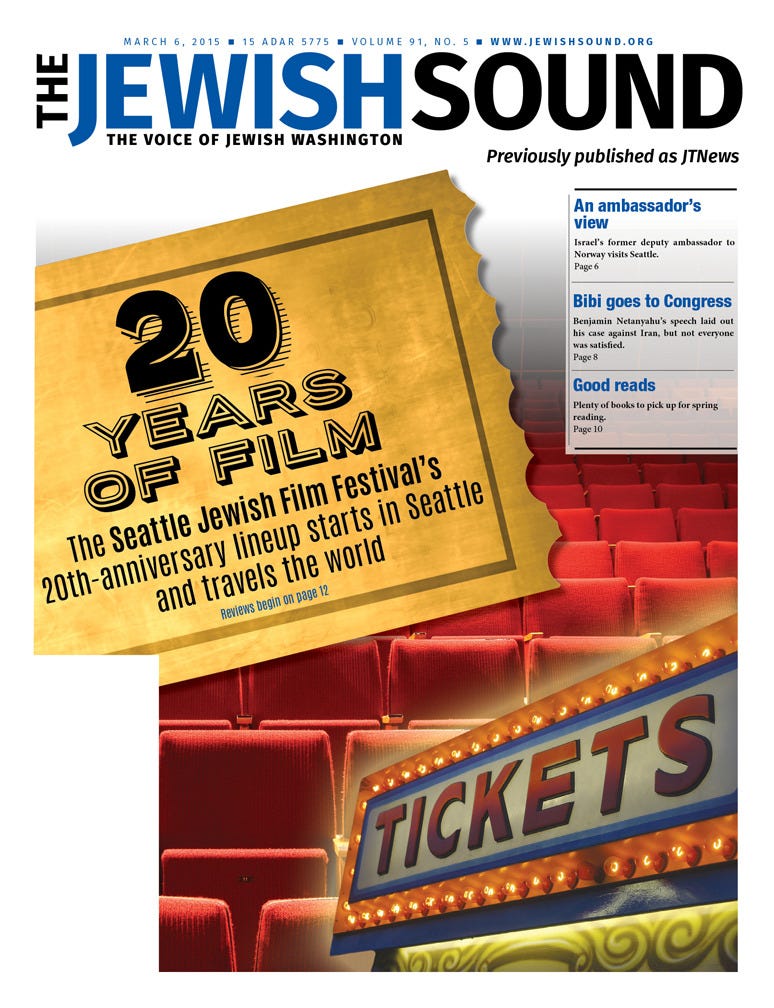This week, I’m pleased to share a guest piece from Joel Magalnick, editor of the defunct JTNews (known originally as The Jewish Transcript and as The Jewish Sound in its final days), who shares his reflections on his time as the editor and publisher of Washington’s Jewish newspaper.
The JTNews holds a special place in my heart, and reading his reflection flooded me with nostalgia for the days when I, new to Seattle and jobless, landed in the seat next to him as assistant, then associate, editor.
I learned a lot from Joel. I gained almost everything I know about journalism from working at the JTNews, where we two editors managed story selection, freelancers, newsletters, social media, wire stories, and, every other week, a grueling night of copy editing the flats, meticulously poring over the paper with a red pen, sending every comma insertion and typo removal over to our long suffering designer.
The JTNews lasted 90 years before folding in 2015, giving way to Jewish in Seattle magazine, which folded in 2020. In the five years I worked at JTNews, I interviewed people like Madeleine Albright and Chief Rabbi Lau, I got to know every local rabbi and Jewish legislator, I even somehow got approval to go on a trip to the Russian Far East and to drive out to the Carlton Complex wildfire to spend two days volunteering with and reporting on IsraAid.
I remember with clarity when Joel told us that the paper was closing. Times had changed. Bar mitzvah announcements went to Facebook, not the newspaper. A local Jewish paper was a nice to have, not a need to have.
About a year ago a reader sent me an opinion piece lamenting the failure of Jewish organizations to support Jewish media while throwing gazillions of dollars at all sorts of “causes.” (The same accusation has been compellingly lobbed at organizations that rake in millions to fight anti-Semitism while Jewish day schools, where actual Jewish pride is fostered, are left to clean out the bank accounts of the few parents willing to make the sacrifice.)
Why, at a time of rampant anti-Zionism and anti-Judaism, do so many American communities seem to shrug off the fact that they have no localized Jewish news sources with accurate, professional, timely reporting? Why are we relying on outlets like the Seattle Times to tell our story for us?
One would think that due to the exponential uptick in anti-Semitism and the fact that Israel’s image has been ruthlessly eviscerated by the mainstream media, that Jewish organizations would summon up the wisdom to comprehend that it is precisely the Jewish media that has the proven ability to intelligently debunk the constant cascade of lies that are being hurled at Israel at a feverish pace. The despicable canards include such baseless accusations as charging Israel with racism and genocide as well as Israel being a colonialist power, an occupier and a barbaric oppressor of Palestinians.
This was the same line of thought that launched the Jewish Transcript in 1924. The Transcript sought to unify communication among Washington’s 15,000-20,000 Jews in the face of rising anti-Semitism from the Klan. Publisher Herman Horowitz wrote:
It is this condition that confronts Jewry of today that has convinced me that the Jew must organize not for aggression but for self-protection. In order to make this organization effective, he must have a means of inter-communication. That means is a newspaper representing his ideas, his ideals, his aspirations and his principles.
Why are Jewish papers so unsustainable? I can think of many reasons: print is obscenely expensive; the news cycle moves too fast; the advertising industry doesn’t have the teeth it once had; the attention economy is saturated; a small Jewish paper can’t unify a community and often only serves to piss off half the people all the time.
Yet as Joel writes, there are few jobs more meaningful than reporting for and about this community. This is why, after Jewish in Seattle closed, I started this newsletter. The idea of letting community news fade away felt like a burden rather than a release.
If we don’t speak for ourselves, who will speak for us?
Requiem for a newspaper
By Joel Magalnick
This week marks 10 years since we put out our last issue of the JTNews, Washington’s Jewish paper that started in 1924 and closed in 2015.
That’s hard for me to believe, because the (very cluttered) physical desk I occupied for much of my 12-year tenure still feels so real to me.
The JTNews (which started as The Jewish Transcript and we rebranded shortly before it closed as The Jewish Sound) remains a big part of my identity, in my own mind and in others’. Just last year, somebody had found some old Transcript photos. The question of what to do with them ended up in my inbox—as if I had the power to make a decision!
Two or three years after we put our last issue of The Jewish Sound to bed, my synagogue asked me to lead an afternoon discussion on Yom Kippur to keep us from raiding our refrigerators. I don’t recall the topic of the presentation, but what I do remember is a member raising her hand and sharing the contributions of the newspaper and what I, as its editor and publisher, had done for the Seattle-area Jewish community. The room applauded. Years after we’d shut down. Talk about humbling.
One of my predecessors once confided that as interesting as his career had been post-Transcript, nothing matched the privilege of telling the stories of his own community. Ten years on, with a lot more miles under my belt, I think he might have been on to something. I split my time between academia and consulting, both of which can be fulfilling. But not as fulfilling.
If you’ll indulge me, I’ll let you in on a few secrets about how the sausage was made. If you open a copy of your Seattle Times on any given day, you’ll see bylines from dozens of writers who make calls, write, and edit in a noisy, crowded newsroom. We had no such luxury—we were an editorial staff of two!
We worked with many freelance writers (to whom we paid a pittance, something I still feel guilty about), which gave a lot of our readers the impression we were a much bigger operation than we actually were. We had one production artist to create the ads and make each issue look beautiful. And of course, as much as our mission stated that we were there to inform and educate our local Jewish community, we were also a business. Four sales reps made up the largest contingent of our staff. Yes, we were lean!
When I first started at the Transcript, our website consisted of me having to create a Microsoft Word file of all of that issue’s articles, send it to some guy across town, and he’d post it as a single web page—sorry, no photos.
That changed pretty quickly. I’d worked in web development prior to coming aboard, so I knew about content management systems, the online databases that run much of the modern web. We tinkered and wrenched and kept up with the latest in these various systems as budgets would allow. We also dabbled in social media relatively early: I remember experimenting with Vine, the now-defunct short video platform, with a local rabbi who became exasperated as I kept asking him to shoot retakes. When we adopted social channels like Facebook and Twitter after they’d been on the market for a little while, we became the go-to experts to our colleagues in other cities.
Moving at that pace today would mean we were already too far behind. But the digital brought us reach; as we came to the end of our run, the readership of our daily newsletter had a larger audience than the print edition.
JTNews was an outlier as the only Federation-owned Jewish newspaper in the country with full editorial independence. This was great for us—we could practice actual journalism, which I believe our readers (usually) appreciated. It wasn’t always great for the Federation. When we printed something someone didn’t like, guess who usually got the phone call?
But it was very important to me that the JT be a journalistic enterprise. We kept a strict wall between editorial and advertising. We didn’t let the organizations and institutions we covered write their own articles (which, sadly, is something of an anomaly in the Jewish press). We did our best to remain objective in our reporting, which would sometimes rub people the wrong way. I won’t apologize for that.
Objectivity became incredibly challenging when it collided with intensely personal issues, such as the 2006 shooting at the Federation offices—our workplace as well. A person I considered a friend and had met with earlier in the day lost her life. The five other shooting victims were our colleagues and friends. In the edition that immediately followed, none of the bylines were mine. I gave the paper to our community for that week, which I hope provided comfort after such a needless tragedy.
We encountered stories where we could have looked the other way. These included allegations of sexual abuse and financial mismanagement. We took heat for giving column inches to Jews who didn’t always fit the mold of a “typical” community member, e.g., Jewish Voice for Peace. I don’t regret that—not because I agreed with them (I don’t), but because a newspaper is not an echo chamber.
It's no secret that Israel continues to divide Jewish communities across North America. Would I give space today to Jews who proudly call themselves anti-Zionist in the aftermath of October 7th? I don’t know. But if I have any PTSD from my dozen years in the editor’s seat, it’s from having to navigate highly passionate opinions about Israel, regardless of perspective. I’ve since moved to a different city with a very different Jewish community, but the Israel issue continues to cause divisions.
I don’t want to be a downer, though. We had fun! Our staff was a family and we all pitched in on (almost) everything. I look back on our annual kosher-for-Passover wine tastings as one of the best parts of the job. Some of the tasters who came back year after year are still people I call friends. (Hi Ned!)
The world has moved much more quickly in the past 10 years than it did in the previous 10, which was also a period of massive change. That said, we’re still writing our story every day. Jewish communities need to know what’s happening in their neighborhoods, in their cities, and across the globe. I will always maintain that a vibrant press, Jewish or not, provides light, especially when the powers that be wish to push us into darkness.
Joel Magalnick served as editor of the former Jewish Transcript/JTNews from 2002 (and added the title of publisher in 2012) until its closure in 2015. Do you have interest in digging into the history of the Jewish Transcript? You can find every article from 1999-ish at https://jewishinseattle.us. Scanned and indexed archives of many of our earlier years live at https://jtn.stparchive.com. Finally, both the periodicals section of the Seattle Public Library’s central location (ask for them at the reference desk) and the Washington State Jewish Historical Society have bound physical copies going back to 1924.
In other news
→Speaking of local journalism, check out the work of the Northwest Yeshiva High School student newspaper, The Mane Idea. Editor Elianna Rothstein covers the surprising news that Head of School Yehuda Gabay is leaving after just two years, giving way to a new era under the leadership of Rabbi Ben Aaronson, who is returning from Israel to take the helm. (Disclosure, I am the faculty adviser to the newspaper.)
→Need a good long-ish read? I enjoyed this story from the BBC about a Sudanese diving resort that was actually a front for a Mossad-driven effort to rescue Ethiopian Jews.
→Another must-read: a lawsuit brings forth the case that Columbia students worked with Hamas, kind of what we all knew, but we’ll see if it holds up in court. Finally attention is turning to Columbia SJP’s oddly timed Instagram post announcing its comeback.
Announcements
Check out the Seattle Jewish community calendar.
Candlelighting in Seattle is at 7:15 p.m. The parasha is Pekudei.
Join Us for Schechter Spark!
Sunday, May 4 • 4-6 p.m.
Camp Solomon Schechter invites the community to Schechter Spark, an annual gathering of connection, celebration, and Camp ruach!
Join us in Seattle as we honor the Schiller Family; in Portland to honor the Atkins Family; and in British Columbia to honor the Siegel Family. These families are being recognized for their dedication, leadership, and impact on our Camp community throughout multiple generations. Funds raised ensure Camp continues to inspire and thrive for years to come. Reconnect with old friends, make new connections, and enjoy delicious food, craft cocktails, and the timeless magic of Camp.
Learn more and RSVP
On April 4-5, Congregation Kol Shalom will present a musical “Scholar in Residence” weekend featuring Zisl Slepovitch renowned ethnomusicologist, composer, musician, and Yiddish educator for a series of lectures and live performances focusing on Jewish and klezmer music. For more info and to register, go to: www.kolshalom.net/scholar. This event is made possible through a grant from Jewish Federation of Greater Seattle.
SURVIVING SURVIVAL: Two Short Stories by Holocaust Survivor Chava Rosenfarb
A little red cap materializes into a child playing in the snow; smoke from memorial candles twists in the air revealing images of lost souls; scraps of detritus magically transform to enchanting toys. In these surreal tales, the ghosts of the past ebb and flow through the lives of Holocaust survivors as they struggle to adjust to life after devastating trauma.
The powerful short stories by renowned Yiddish writer Chava Rosenfarb, herself born and raised in Lodz, Poland and a survivor of the Lodz Ghetto, have been newly translated into English by her daughter, Goldie Morgentaler. Evocative and unsetting, these narratives of Surviving Survival explore the intricacies of memory, guilt, and the delicate balancing act of moving through pain to achieve stability. This production, by Tales of the Alchemysts Theatre, will weave music, song, and dance into a portable stage reading.
Saturday March 29, 7:30 p.m.; Sunday, March 30, 1 p.m. Isaac Studio at Taproot Theatre, 212 N. 85 St., Seattle
Tickets: alchemysts.click4tix.com
Shoutouts
Shouting out the most amazing Barbara Maduell, Sr. Campaign Director at TDHS for dedicating so much of her extraordinary mind and heart to this Jewish community for decades. We first worked together on the JDS capital campaign back in 2004. I've watched her grow organizations with grace, brilliance and passion, her latest being for Temple DeHirsch Sinai. —Alayne Sulkin
Congratulations to Pamela Lavitt on her 20 year anniversary directing the Seattle Jewish Film Festival. And Yasher Koach to the many, many volunteers who screened over one hundred films and chose an outstanding lineup for the festival’s 30th - Pearl Anniversary. —Mindy Stern
Mazel tov to Pamela Lavitt and Eloise Wukmir for a fantastic 30th Annual Pearl Anniversary Jewish Film Festival! It’s not over yet but their incredible work must be recognized now. Kol ha’kavod! —Jessica Prince
Shoutout from the WSJHS to the Seattle Jewish Film Festival for all the work that goes into the festival. Come see our sponsored film on Sunday, 3/30 and participate in our first popup Story Booth. Special thanks for the Washington State Legislature for funding and to 4Culture for all the support! —Lisa Kranseler









Thank you so much, Joel Magalnick, for sharing your managerial experiences with the JT News. I, too, miss our local Jewish community news. Thanks, too, for remembering and reminding us of many events such as the Passover wine tasting reviews. We wish you well in your new city. We miss you.
Ned Porges
Jewish news is incredibly important right now, but it's not just the local ones that are struggling. Three years ago, I had a fairly thriving gig steadily freelancing for the national and international outlets, like Tablet, Forward, and Jewish Telegraphic Agency. I left for a year for a full-time job, then tried to take it back up because I love Jewish journalism. Unfortunately, none of my former editors were biting. They were turning down pitches that would have easily landed a couple years prior. When I asked two of them, they encouraged me to keep submitting but said that their publications had essentially tightened, and they no longer had the budgets to pay freelancers. One said that he used to accept 2-4 freelance articles a week, but now it was more like 2 a month. I'm wondering if this says something about the state of Jewish news around the world and that the closing of the JT News pre-dated a descent.